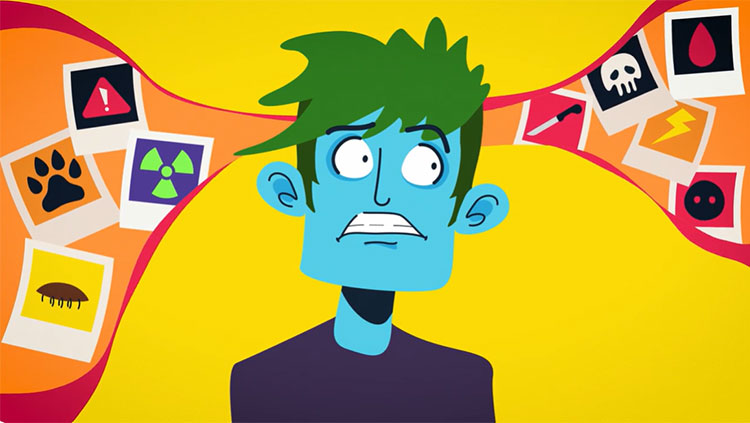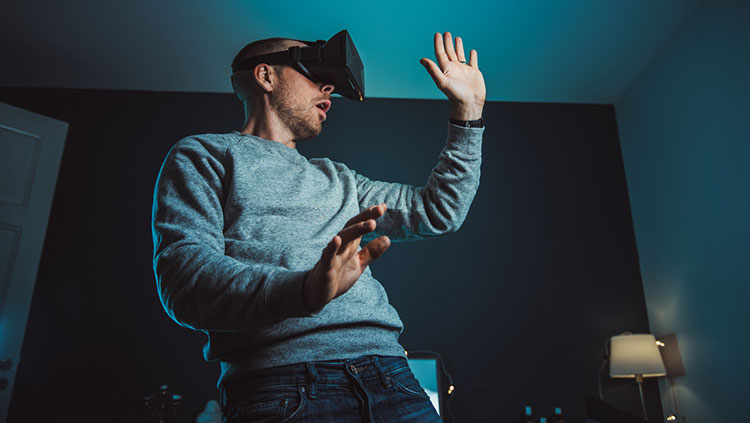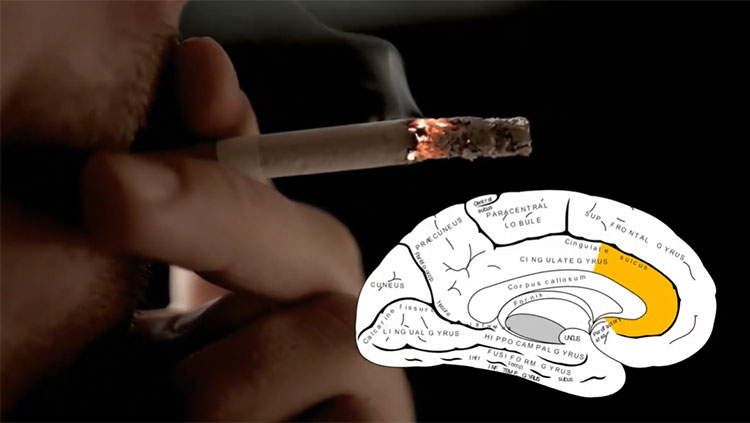The Immune System May be a Regulator of Fear and Anxiety
- Published9 Oct 2024
- Author Ailie McWhinnie
- Source BrainFacts/SfN

Though the brain was once thought to be isolated from the immune system, new evidence of the mind-body connection is emerging, linking inflammation to mental health disorders like PTSD and anxiety.
Some immune cells and their signaling molecules can enter the brain, and the brain itself has an army of immune cells that outnumber neurons. Long dismissed as support cells, immune cells are now recognized as having active roles to play in brain functions including emotion. Preliminary research presented at Neuroscience 2024 in Chicago, the Society for Neuroscience’s annual meeting, reveals immune cells in both the body and brain are key regulators of fear and anxiety.
New Target for Anxiety Therapy Discovered in the Immune System
Some immune cells increase inflammation by attacking pathogens or recruiting other immune cells to the infection, and others — called regulatory T-cells, or T-regs for short — dampen this inflammatory response.
“It’s like a seesaw,” says Freya Shepherd, a neuroscientist at Cardiff University. When the body is invaded by a virus or bacteria, inflammation shoots up and T-reg activity dips down so infection can be cleared. But then T-regs must bring the immune system back to balance. If T-reg levels are too low, the attacking cells are left unchecked, and the prolonged inflammation harms the body.
Recently, T-regs were found to cross into the brain, a process thought impossible due to the blood-brain barrier. Following increasing curiosity about T-regs' role in brain function, scientists at Cardiff University questioned whether the inflammation associated with depleted T-regs could influence anxiety.
They depleted T-regs in mice and observed their behavior. The mice performed normally in tests of movement and cognition, showing the loss of T-regs did not disrupt those baseline functions. But in anxiety-related tests, the impact was clear. On a platform, mice with depleted T-regs were more cautious, sticking to safer, covered areas and avoiding exposed sections. This anxiety-like behavior was more pronounced in female mice.
These findings suggest T-regs play a role in regulating anxiety and could be a new target for treatment, though whether the body T-regs or brain T-regs matter more is unknown. Drugs boosting T-regs have already been developed. They work by increasing a molecule called interleukin-2, which directly increases T-reg production. These drugs are used to target various cancers, but recent studies in mice found targeting them to the brain protects against traumatic brain injury and stroke. If researchers find a way to deliver these drugs to the brain in humans, studies like Shepherd’s suggest they could be useful for some people with anxiety, too.
Immune Cells in the Brain Regulate Fear
Fear memories help us avoid danger. But if a threat becomes harmless, a new extinction memory forms to suppress the fear.
“These two memories — fear and fear extinction memories — are co-existing in the brain,” explains Olena Bukalo, a researcher at the National Institute of Alcohol Abuse and Alcoholism. As the extinction memory becomes stronger, the fear response decreases.
But sometimes, this process goes wrong. “When high fear states dominate because a fear memory is amplified, or fails to extinguish, it can lead to conditions like increased anxiety or post-traumatic stress disorder,” says Bukalo.
Emerging evidence has implicated astrocytes, the most abundant type of brain immune cells, in fear extinction. But how they influence it was unknown. Bukalo and her team sought to answer this question by studying astrocytes in the basolateral amygdala, a brain region involved in motivation and emotion.
The researchers first had to condition mice to fear a sound by pairing it with a mild shock. This caused a fear memory to form so even after the shocks stopped, the mice continued to freeze in fear when hearing it. With time, though, they realized the shocks no longer came with the sound and gradually stopped freezing, indicating extinction was occurring.
They tracked astrocyte activity throughout this process and discovered it mirrored the mice’s fear responses. As fear increased, so did astrocyte activity, and the reverse was true as freezing decreased. More significantly, manipulating astrocyte activity caused changes in the activity of fear memory neurons, indicating astrocytes are not just responding to changes in fear state but can actually drive it.
Studies like this underscore the need to rethink drug screening. Neuron cultures and brain organoids are being used to mass test potential drugs, but these don’t account for effects on astrocytes.
“Current drug testing approach is mainly focusing on neuronal function. But our and others’ data shows that astrocytes can affect memory,” Bukalo commented. “For any drug testing, you should have a system that reports how the drug changes astrocyte function.”
CONTENT PROVIDED BY
BrainFacts/SfN
References
Liston et al. (2022). Brain-resident regulatory T cells and their role in health and disease. Immunology Letters, 248, 26-30. https://doi.org/10.1016/j.imlet.2022.06.005
Li et al. (2022). Astrocytes in Post-traumatic Stress Disorder. Neurosci Bull, 38(8), 953-965. https://doi.org/10.1007/s12264-022-00845-6
Also In Emotions, Stress & Anxiety
Trending
Popular articles on BrainFacts.org


















